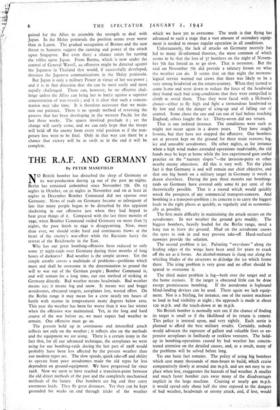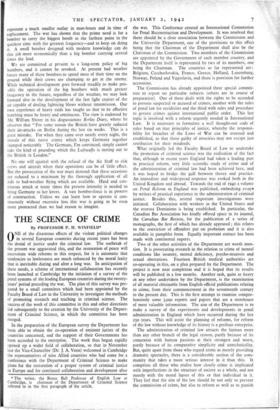THE R.A.F. AND GERMANY
By PETER MASEF1ELD
NO British bomber has disturbed the sleep of Germany or its war-production during 54 out of the past 90 nights. Berlin has remained unbombed since November 7th. On 13 nights in October, on zo nights in November and on at least 21 nights in December Bomber Command did not operate over Germany. News of raids on Germany became so infrequent of late that many people began to be disturbed by this apparent slackening in our offensive just when they had hoped to hear great things of it. Compared with the last three months of 194o, when Bomber Command raided Germany on more than 75 nights, the poor finish to 1941 is disappointing. Now, more than ever, we should strike hard and continuous blows at the heart of the enemy's war-effort while the Russians harry the retreat of the Reichswehr in the East.
Why has our great bombing-offensive been reduced to only some 37 night-raids over Germany during three months of long hours of darkness? Bad weather is the simple answer. Yet the simple answer covers a multitude of problems—problems which must and shall be overcome in the determination to pound the will to war out of the German people ; Bomber Command is; and will remain for a long time, our one method of striking at Germany directly. Bad weather means headwinds. Bad weather means ice; it means fog and snow. It means wet and boggy aerodromes, obscured targets, aeroplanes lost, wasted effort. On the Berlin range it may mean for a crew nearly ten hours of battle with storms in temperatures many degrees below zero. This year the weather has been far worse than it was last winter when the offensive was maintained. Yet, in the long and hard course of the war before us, we must expect bad weather to remain. Our offensive must go on.
The present hold up in continuous and intensified attack reflects not only on the weather ; it reflects also on the methods and the equipment we are using. There is a certain irony in the fact that, for all our advanced technique, the aeroplanes we were using for our bombing-raids during the last part of 1918 would probably have been less affected by the present weather than our modern types are. The slow speeds, quick take-off and ability to operate from poor aerodromes made the old types far less dependent on ground-equipment. We have progressed far since 1918. Now we seem to have reached a transition-point between the old direct methods of the past and the completely mechanised methods of the future. Our bombers are big and they carry enormous loads. They fly great distances. Yet they can be kept grounded for weeks on end through tricks of the weather which we have yet to overcome. The truth is that flying has advanced to such a stage that a vast amount of secondary equip- ment is needed to ensure regular operation in all conditions.
Unfortunately, the lack of attacks on Germany recently has led to many ill-informed theories, the most common of which seems to be that the loss of 37 bombers on the night of Novem- ber 7th has forced us to go slow. That is nonsense. But the raid on November 7th did provide a salutary lesson on what the weather can do. It seems that on that night the meteoro- logical service warned our crews that there was likely to be a very strong headwind on the return-journey. When they turned to come home and went down to reduce the force of the headwind they found such bad icing-conditions that they were compelled to climb to avoid them. Thus they were faced with a Hobson's choice—either to fly high and fight a tremendous headwind or fly low and risk the danger of icing-up and of falling out of control. Some chose the one and ran out of fuel before reaching England, others fought the ice. Thirty-seven did not return.
That is one isolated instance. The conditions were such as might not occur again in a dozen years. They have taught lessons, but they have not stopped the offensive. Our bombers are at present kept on the ground for three main reasons; fog, ice and unusable aerodromes. On other nights, as far instance when a high wind makes extended operations inadvisable, the old hands may be kept at home while the less experienced gain useful practice on the " nursery slopes "—the invasion-ports or other nearby enemy objectives. All this is very well. Yet the plain fact is that Germany is and will remain our chief objective, and that one big bomb on a military target in Germany is worth a dozen elsewhere. During the past three months our bombing- raids on Germany have covered only some 61 per cent. of the theoretically possible. That is a record which would quickly wreck the prospects of any commercial transport-concern. And bombing is a transport-problem ; its concern is to carry the biggest loads to the right places as quickly, as regularly and as economic- ally as possible.
The first main difficulty in maintaining the attack occurs on the aerodromes. In wet weather the ground gets muddy. The biggest bombers, heavily loaded for the Berlin range, need a long run to leave the ground. Mud on the aerodrome causes the tyres to sink in and may prevent take-off. Hard-surfaced runways provide the solution.
The second problem is ice. Pulsating " overshoes " along the leading edges of the wings have been used for years to crack off the ice as it forms. An alcohol-mixture is slung out along the whirling blades of the airscrews to dislodge the ice which forms there. The icing problem is very great and no effort should be spared to overcome it.
The third major problem is fog—both over the target and at the home stations. If the target is obscured little can be done except promiscuous bombing. If the aerodrome is fogbound blind-landing devices can be used. There again we lack equip- ment. Nor is a Stirling, for instance, one of the easiest machines to land in bad visibility at night ; the approach is made at about 120 m.p.h. and the touch-down at 90 m.p.h.
No British bomber is normally sent out if the chance of finding its target is small or if the likelihood of its return is remote. This policy is insisted upon, and very rightly. Each sortie is planned to afford the best military results. Certainly, nobody would advocate the exposure of gallant and valuable lives or ex- pensive aeroplanes in foolhardy or reckless ventures. The hold- up in bombing-operations caused by bad weather has concen- trated attention on the detailed causes, and, as a result, many of the problems will be solved before long.
Yet one basic fact remains. The policy of using big bombers which cost many thousands of man-hours to build, which cruise comparatively slowly at around 200 m.p.h. and are not easy to re- place when lost, exaggerates the hazards of bad weather. A smaller and much faster bomber cuts away many of the disadvantages implicit in the large machine. Cruising at nearly 400 m.p.h. it would spend only about half the time exposed to the dangers of bad weather, headwinds or enemy attack, and, if lost, would
represent a much smaller outlay in man-hours and in time of replacement. The war has shown that the prime need is for a bomber to carry the biggest bomb to the farthest point in the quickest time with the greatest frequency—and to keep on doing it. A small bomber designed with modem knowledge can do this job more economically than a big bomber carrying several times the load.
We are committed at present to a long-term policy of big bombers, and it cannot be revoked. At present bad weather forces many of these bombers to spend most of their time on the ground while their crews are champing to get at the enemy. While technical development goes forward steadily to make .pos- sible the operation of the big bombers with much greater frequency in the future, regardless of the weather, we may look forward also to the development of the fast light cruiser of the air capable of dealing lightning blows without intermission. Our own experience of heavy raids has taught us that to be effective bombing must be heavy and continuous. The view is endorsed by Mr. William Shirer in his dispassionate Berlin Diary, where he observes that " For some reason the British have greatly reduced their air-attacks on Berlin during the last six weeks. This is a great mistake. For when they came over nearly every night, the morale of this nerve centre which keeps Germany together slumped noticeably. The Germans, I'm convinced, simply cannot take the kind of pounding which the Luftwaffe is meting out to the British in London."
No one will quarrel with the refusal of the Air Staff to risk crews and aircraft when their operations can be of little effect. But the prosecution of the war must demand that these occasions are reduced to a minimum by the thorough application of all aids to bad-weather flying which are available. Hard and con- tinuous attack at many times the present intensity is needed to bring Germany to her knees. A vast bomber-force is in process of construction. Unless we can learn how to operate it con- tinuously without excessive loss this war is going to be even more protracted than we had reason to imagine.



























 Previous page
Previous page